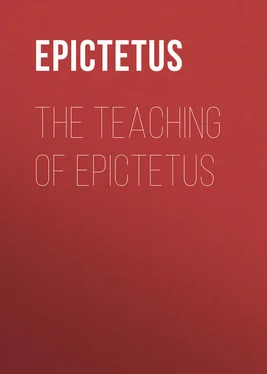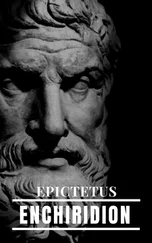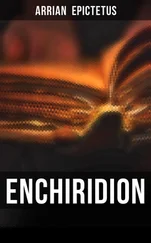Epictetus - The Teaching of Epictetus
Здесь есть возможность читать онлайн «Epictetus - The Teaching of Epictetus» — ознакомительный отрывок электронной книги совершенно бесплатно, а после прочтения отрывка купить полную версию. В некоторых случаях можно слушать аудио, скачать через торрент в формате fb2 и присутствует краткое содержание. Жанр: Философия, foreign_antique, foreign_prose, на английском языке. Описание произведения, (предисловие) а так же отзывы посетителей доступны на портале библиотеки ЛибКат.
- Название:The Teaching of Epictetus
- Автор:
- Жанр:
- Год:неизвестен
- ISBN:нет данных
- Рейтинг книги:5 / 5. Голосов: 1
-
Избранное:Добавить в избранное
- Отзывы:
-
Ваша оценка:
- 100
- 1
- 2
- 3
- 4
- 5
The Teaching of Epictetus: краткое содержание, описание и аннотация
Предлагаем к чтению аннотацию, описание, краткое содержание или предисловие (зависит от того, что написал сам автор книги «The Teaching of Epictetus»). Если вы не нашли необходимую информацию о книге — напишите в комментариях, мы постараемся отыскать её.
The Teaching of Epictetus — читать онлайн ознакомительный отрывок
Ниже представлен текст книги, разбитый по страницам. Система сохранения места последней прочитанной страницы, позволяет с удобством читать онлайн бесплатно книгу «The Teaching of Epictetus», без необходимости каждый раз заново искать на чём Вы остановились. Поставьте закладку, и сможете в любой момент перейти на страницу, на которой закончили чтение.
Интервал:
Закладка:
Pyrrho of Elis, a rather earlier teacher than Zeno or Epicurus, who is said to have studied philosophy under Indian Gymnosophists and Chaldean Magi, was the originator in European thought of a great and permanent philosophic movement. His school was inspired by the Geist der stets verneint , and the term Skeptic was first devised to describe its attitude. Its strength is in a discovery which inevitably takes place when men begin to reflect upon their own mental operations – the discovery, namely, that, given a perceiving mind and a perceived object, it is always possible for the former, if it has the power of introspection, to doubt whether it has received a really true and faithful impression of the latter. How can we be assured that external objects are as we perceive them? How can we even be assured that there is any principle of constancy in their relations to our consciousness? The senses often delude us; we are convinced, in dreams, of the reality of appearances which, nevertheless, have no reality – why may not all perception be a delusion? Why may not even our sense of the validity of inference and of the truth of the axioms of geometry be a pure hallucination? With these searching questions the Skeptic cut at the root of all belief, and the problems which they raise have dominated philosophy down to the present day. Nor in two thousand years has any logical answer to them ever been found. Lotze, the last thinker of really first-rate powers that the world has seen, practically abandons all inquiry into theories of perception, and starts with the assumption that we are living in a kosmos, not a chaos; that the order, coherence, reason in things to which consciousness testifies, are realities. In antiquity, I may add, the profound problems raised by Pyrrhonism do not seem to have been very profoundly apprehended either by the Pyrrhonists or their opponents. The latter had nothing better to appeal to than that notoriously feeble resource, the argumentum ad hominem . If the Pyrrhonist distrusted the evidence of his senses, they asked, why did he avoid walking over precipices or into the sea, or eat bread instead of earth, or in any way make choice of means for ends? The Pyrrhonist’s answer was equally superficial. It anticipated the famous formula of Bishop Butler. Probability, argued they, was the guide of life – having observed certain results to follow from certain antecedents, the prudent man will shape his course in life accordingly, although, as a matter of theory and speculation, he may refuse to believe in the constancy of nature. This answer involves a clear inconsistency. It involves even a greater assumption than that which the Pyrrhonist refused to make as to the credibility of his perceptions – the assumption of the credibility of his recollections. To the thorough-going Skeptic there is no such thing as past experience – he is, as it were, new-born at each instant of his life.
Such, in outline, were the systems against which the Stoic philosophy had to make good its position in the ancient world. From the first there seems to have been no doubt of its ability to do so, although, unhappily, the records which have been preserved of the teaching of its earliest days are few and obscure. The writings of Zeno, the founder of Stoicism, and of Chrysippus, his immediate successor in the leadership of the school, have utterly perished, while of Cleanthes, the third of the early Stoic teachers, very little remains beyond the profound and majestic Hymn to Zeus, of which I have given a translation in this work. The complete loss of the hundreds of treatises produced by Chrysippus is especially to be regretted, as he appears to have taken the main part in giving shape and system to the Stoic philosophy. “Had Chrysippus not been, the Stoa had not been,” was a proverbial saying which testifies to his fame. However, from the accounts of ancient philosophers in Diogenes Laertius, from Plutarch, Seneca, Cicero, and a few other authorities, we can learn pretty clearly what the framework of the Stoic system had grown to be long before Epictetus began to study it.
In antiquity, a philosophic system was expected to have something to say for itself on three different branches of study – Logic, Physics (which included cosmogony and theology), and Ethics. We think of the Stoics chiefly in connection with the last-named of these subjects, but they were no less eminent in the others, and Chrysippus, in particular, was held to have done so much for the science of logic that a saying was current – “If there were dialectic among the Gods, it must be the dialectic of Chrysippus.” Of the Stoic contributions to this science, scarcely any record remains.
Of their physical system, however, much is known, and the reader of Epictetus needs to be acquainted with its general features. These were borrowed from an earlier thinker, Heracleitus, whose central doctrine was that the universe was an eternal flux and transition; everything was in a state of becoming, ein Werdendes . At the beginning of things, so far as they can be said to have any beginning, is the Deity in his purest manifestation, which, be it observed, is a strictly material one, a sublimated and ethereal fire, αἰθερῶδες πῦρ. In this fire dwelt the divine creative thought and impulse. The first step in that process of differentiation in which development consists is the production of vapor, which condensed into water. Two elementary forces play their part in these operations – a movement towards within, and a movement towards without, the one a densifying, the other an expanding and straining force (τόνος). The former gives us solidity in matter, the other the qualities and energies of matter. Thus, by various degrees of density, we get earth, water, atmospheric air, and from air, the common element of earthly fire; and these elements in their various combinations, with their various attributes and powers, gradually produce the successive stages of organic life. Though all these proceed from the substance of the Divine Being, the Stoics recognized, in the derived substance which make up the universe as we have it now, various degrees of purity, of affinity to their original source. Man’s body, for instance, with its passions and affections, lies comparatively far from the divine; but his soul is a veritable ray of the primitive fire, Deus in corpore humano hospitans . The popular mythology of the day was entirely rejected by the Stoics, although, as Professor Mahaffy points out, they never attempted to “discredit orthodoxy,” but, on the contrary, used its myths and ceremonies with the utmost reverence as vehicles of profound religious truths. But they certainly believed in intelligences above man, yet below the one Supreme Being; thus the stars and the lightning (the reader will observe the allusions in the Hymn of Cleanthes) are in some sense divinities, by virtue of the supposed purity of their fiery essence.
Thus from the one primitive divine element the Kosmos, with all its hierarchy of being, is evolved. But in the Stoic system πάντα ῥεῖ, 3 3 πάντα ῥεῖ, all flows – the cardinal doctrine of the Heracleitean philosophy.
there is no continuance in any one condition. As in the normal life of all earthly creatures there comes a certain climax or turning point, after which the forces of decay gain slowly but surely on those of growth and resistance, so also runs the history of the universe which includes them all. One by one the steps by which it was formed shall be retraced, and the derived substances which compose it consumed and re-absorbed by that from which they sprang. From matter in its grossest form to its purest, from earth and stone and water to the highest intelligence in men and dæmons and Gods, nothing shall escape this doom of dissolution; everything shall yield up its separate existence, until at last the indestructible element of that primeval fire is again the sole being that remains, and Zeus is “alone in the conflagration,” self-contemplating in the solitudes of thought. But this is not the end. There is no end. The plastic impulse again resumes its sway, and soon another cycle of world-development and world-destruction begins to run its course. In the language of Seneca, “When that fatal day, that necessity of the times, shall have arrived, and it seems good to God to make an end of old things and ordain the better, then shall the ancient order be revoked and every creature be generated anew, and a race ignorant of guilt be given to the earth.”
Интервал:
Закладка:
Похожие книги на «The Teaching of Epictetus»
Представляем Вашему вниманию похожие книги на «The Teaching of Epictetus» списком для выбора. Мы отобрали схожую по названию и смыслу литературу в надежде предоставить читателям больше вариантов отыскать новые, интересные, ещё непрочитанные произведения.
Обсуждение, отзывы о книге «The Teaching of Epictetus» и просто собственные мнения читателей. Оставьте ваши комментарии, напишите, что Вы думаете о произведении, его смысле или главных героях. Укажите что конкретно понравилось, а что нет, и почему Вы так считаете.












